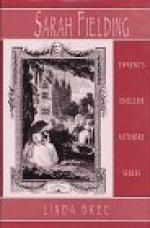|
This section contains 7,388 words (approx. 25 pages at 300 words per page) |

|
SOURCE: "Sarah Fielding's Self-Destructing Utopia: The Adventures of David Simple," in Living by The Pen: Early British Women Writers, edited by Dale Spender, Teachers College Press, 1992, pp. 65–81.
In the excerpt below, Woodward argues that Fielding's David Simple is a critique of the feminine virtues prescribed by capitalist-patriarchal society, and suggests that domestic ideology confined and stultified Fielding herself.
Utopian Visions and Feminist Theory
… In The Adventures of David Simple (1744 and 1753),1 Sarah Fielding considers the human need for friendship and criticizes patriarchy for the greed and mistrust fostered by its hierarchies. She finds patriarchal capitalism responsible for the maintenance in society of what she believes are negative feminine virtues: innocence, passivity, and privacy. Further, she presents an alternative system, and is bold in her vision of a utopia that insists on the centrality of what she sees as true feminine values, nurturance, and nonhierarchical sharing. And, finally, she destroys...
|
This section contains 7,388 words (approx. 25 pages at 300 words per page) |

|


